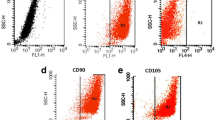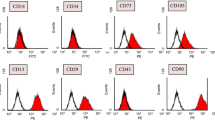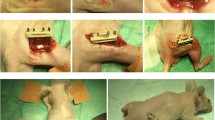Abstract
In this study, rabbit adipose-derived stem cells (rASCs) were isolated, cultured in vitro, and transfected with recombinant adenovirus vector containing human bone morphogenetic protein 2 (Ad-hBMP2). These cells were combined with a nano-hydroxyapatite/recombinant human-like collagen/poly(lactic acid) scaffold (nHA/RHLC/PLA) to fabricate a new biocomposite (hBMP2/rASCs-nHA/RHLC/PLA, group 1) and cultured in osteogenic medium. Non-transfected rASCs mixed with nHA/RHLC/PLA (rASCs-nHA/RHLC/PLA, group 2) and nHA/RHLC/PLA scaffold alone (group 3) served as controls. Scanning electron microscope (SEM) demonstrated integration of rASCs with the nHA/RHLC/PLA scaffold. Quantitative real-time RT-PCR analyses of collagen I, osteonectin, and osteopontin cDNA expression indicated that the osteogenic potency of rASCs was enhanced by transfection with Ad-hBMP2. After in vitro culture for seven days, three groups were implanted into 15-mm length critical-sized segmental radial defects in rabbits. After 12 weeks, radiographic and histological analyses were performed. In group 1, the medullary cavity was recanalised, bone was rebuilt and moulding was finished, the bone contour had begun to remodel and scaffold was degraded completely. In contrast, bone defects were not repaired in groups 2 or 3. Furthermore, the scaffold degradation rate in group 1 was significantly higher than in groups 2 or 3. In summary, after transduction with Ad-hBMP2, the osteogenesis of rASCs was enhanced; a new biocomposite created with these cells induced repair of a critical bone defect in vivo in a relatively short time.







Similar content being viewed by others
References
Yuan J, Cui L, Zhang WJ, Liu W, Cao Y (2007) Repair of canine mandibular bone defects with bone marrow stromal cells and porous beta-tricalcium phosphate. Biomaterials 28:1005–1013
Di Bella C, Farlie P, Penington AJ (2008) Bone regeneration in a rabbit critical-sized skull defect using autologous adipose-derived cells. Tissue Eng Part A 14:483–490
Yoon E, Dhar S, Chun DE, Gharibjanian NA, Evans GR (2007) In vivo osteogenic potential of human adipose-derived stem cells/poly lactide-co-glycolic acid constructs for bone regeneration in a rat critical-sized calvarial defect model. Tissue Eng 13:619–627
De Ugarte DA, Morizono K, Elbarbary A, Alfonso Z, Zuk PA, Zhu M, Dragoo JL, Ashjian P, Thomas B, Benhaim P, Chen I, Fraser J, Hedrick MH (2003) Comparison of multi-lineage cells from human adipose tissue and bone marrow. Cells Tissues Organs 174:101–109
Hicok KC, Du Laney TV, Zhou YS, Halvorsen YD, Hitt DC, Cooper LF, Gimble JM (2004) Human adipose-derived adult stem cells produce osteoid in vivo. Tissue Eng 10(3–4):371–380
Mauney JR, Kirker-Head C, Abrahamson L, Gronowicz G, Volloch V, Kaplan DL (2006) Matrix-mediated retention of in vitro osteogenic differentiation potential and in vivo bone-forming capacity by human adult bone marrow-derived mesenchymal stem cells during ex vivo expansion. J Biomed Mater Res A 79:464–475
Dragoo JL, Choi JY, Lieberman JR, Huang J, Zuk PA, Zhang J, Hedrick MH, Benhaim P (2003) Bone induction by BMP-2 transduced stem cells derived from human fat. J Orthop Res 21:622–629
Turgeman G, Aslan H, Gazit Z, Gazit D (2002) Cell-mediated gene therapy for bone formation and regeneration. Curr Opin Mol Ther 4:390–394
Wang M (2003) Developing bioactive composite materials for tissue replacement. Biomaterials 24:2133–2251
Van Landuyt P, Li F, Keustermans JP, Streydio JM, Delannay F, Munting E (1995) The influence of high sintering temperatures on the mechanical properties of hydroxyapatite. J Mater Sci Mater Med 6:8–13
Zhang PB, Hong ZK, Yu T, Chen XS, Jing XB (2009) In vivo mineralization and osteogenesis of nanocomposite scaffold of poly (lactide-co-glycolide) and hydroxyapatite surface-grafted with poly(L-lactide). Biomaterials 30:58–70
Webster TJ, Ergun C, Doremus RH, Siegel RW, Bizios R (2000) Specific proteins mediate enhanced osteoblast adhesion on nanophase ceramics. J Biomed Mater Res 51:475–483
Webster TJ, Siegel RW, Bizios R (1999) Osteoblast adhesion on nanophase ceramics. Biomaterials 20:1221–1227
Wang Y, Cui FZ, Hu K, Zhu XD, Fan DD (2008) Bone regeneration by using scaffold based on mineralized recombinant collagen. J Biomed Mater Res B Appl Biomater 86:29–35
Zhai Y, Cui FZ (2006) Recombinant human-like collagen directed growth of hydroxyapatite nanocrystals. J Cryst Growth 291:202–206
Wang Y, Cui FZ, Zhai Y, Wang XM, Kong XD, Fan DD (2006) Investigations of the initial stage of recombinant human-like collagen mineralization. Mat Sci Eng 26:635–638
Wu B, Zheng Q, Guo X, Wu Y, Wang Y, Cui F (2008) Preparation and ectopic osteogenesis in vivo of scaffold based on mineralized recombinant human-like collagen loaded with synthetic BMP-2-derived peptide. Biomed Mater 3:44111
Hao W, Hu YY, Wei YY, Pang L, Lv R, Bai JP, Xiong Z, Jiang M (2008) Collagen I gel can facilitate homogenous bone formation of adipose-derived stem cells in PLGA-beta-TCP scaffold. Cells Tissues Organs 187:89–102
Livak KJ, Schmittgen TD (2001) Analysis of relative gene expression data using real-time quantitative PCR and the 2(-delta delta C(T)) method. Methods 25:402–408
Li H, Dai K, Tang T, Zhang X, Yan M, Lou J (2007) Bone regeneration by implantation of adipose-derived stromal cells expressing BMP-2. Biochem Biophys Res Commun 356:836–842
Peterson B, Zhang J, Iglesias R, Kabo M, Hedrick M, Benhaim P, Lieberman JR (2005) Healing of critically sized femoral defects, using genetically modified mesenchymal stem cells from human adipose tissue. Tissue Eng 11:120–129
Cuomo AV, Virk M, Petrigliano F, Morgan EF, Lieberman JR (2009) Mesenchymal stem cell concentration and bone repair: potential pitfalls from bench to bedside. J Bone Joint Surg Am 91:1073–1083
Schantz JT, Hutmacher DW, Lam CX, Brinkmann M, Wong KM, Lim TC, Chou N, Guldberg RE, Teoh SH (2003) Repair of calvarial defects with customised tissue-engineered bone grafts II. Evaluation of cellular efficiency and efficacy in vivo. Tissue Eng 9(Suppl 1):S127–S139
Weinand C, Pomerantseva I, Neville CM, Gupta R, Weinberg E, Madisch I, Shapiro F, Abukawa H, Troulis MJ, Vacanti JP (2006) Hydrogel-beta-TCP scaffolds and stem cells for tissue engineering bone. Bone 38:555–563
Hauser J, Zietlow J, Köller M, Esenwein SA, Halfmann H, Awakowicz P, Steinau HU (2009) Enhanced cell adhesion to silicone implant material through plasma surface modification. J Mater Sci Mater Med 20(12):2541–2548. doi:10.1007/s10856-009-3826-x
Pang L, Hu YY, Yan YN, Liu L, Xiong Z, Wei YY, Bai JP (2007) Surface modification of PLGA/β-TCP scaffold for bone tissue engineering: hybridization with collagen and apatite. Surf Coat Technol 201:9549–9557
Digirolamo CM, Stokes D, Colter D, Phinney DG, Class R, Prockop DJ (1999) Propagation and senescence of human marrow stromal cells in culture: a simple colony-forming assay identifies samples with the greatest potential to propagate and differentiate. Br J Haematol 107:275–281
Sugiura F, Kitoh H, Ishiguro N (2004) Osteogenic potential of rat mesenchymal stem cells after several passages. Biochem Biophys Res Commun 316:233–239
Boden SD, Kang J, Sandhu H, Heller JG (2002) Use of recombinant human bone morphogenetic protein-2 to achieve posterolateral lumbar spine fusion in humans: a prospective, randomized clinical pilot trial: 2002 Volvo Award in clinical studies. Spine (Phila Pa 1976) 27:2662–2673
Sakou T (1998) Bone morphogenetic proteins: from basic studies to clinical approaches. Bone 22:591–603
Diefenderfer DL, Osyczka AM, Garino JP, Leboy PS (2003) Regulation of BMP-induced transcription in cultured human bone marrow stromal cells. J Bone Jt Surg Am 85-A(Suppl 3):19–28
Luk KD, Chen Y, Cheung KM, Kung HF, Lu WW, Leong JC (2003) Adeno-associated virus-mediated bone morphogenetic protein-4 gene therapy for in vivo bone formation. Biochem Biophys Res Commun 308:636–645
Crystal RG (1995) Transfer of genes to humans: early lessons and obstacles to success. Science 270:404–410
Nasu T, Ito H, Tsutsumi R, Kitaori T, Takemoto M, Schwarz EM, Nakamura T (2009) Biological activation of bone-related biomaterials by recombinant adeno-associated virus vector. J Orthop Res 27:1162–1168
Yazici C, Yanoso L, Xie C, Reynolds DG, Samulski RJ, Samulski J, Yannariello-Brown J, Gertzman AA, Zhang X, Awad HA, Schwarz EM (2008) The effect of surface demineralization of cortical bone allograft on the properties of recombinant adeno-associated virus coatings. Biomaterials 29:3882–3387
Author information
Authors and Affiliations
Corresponding author
Additional information
Wei Hao, Jinlei Dong and Ming Jiang contributed equally to this article.
Rights and permissions
About this article
Cite this article
Hao, W., Dong, J., Jiang, M. et al. Enhanced bone formation in large segmental radial defects by combining adipose-derived stem cells expressing bone morphogenetic protein 2 with nHA/RHLC/PLA scaffold. International Orthopaedics (SICOT) 34, 1341–1349 (2010). https://doi.org/10.1007/s00264-009-0946-3
Received:
Revised:
Accepted:
Published:
Issue Date:
DOI: https://doi.org/10.1007/s00264-009-0946-3




